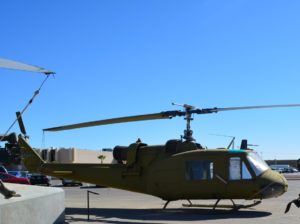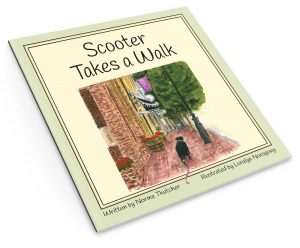
I was just a young woman when America’s official involvement in the Vietnam war ceased. Several high school friends engaged in active combat there; remarkably and thankfully, none of them died while serving our country.
The Huey helicopter (nicked for the designation UH) played a pivotal role for our soldiers in that war. Many were used for medical evacuation while other UH variations were used for air assault, troop transport, and as gunships.
According to GlobalSecurity.org, the UH-1V carried no weapons, and could carry six stretchers or three litter patients and four ambulatory patients.
Some years ago my husband and I toured Wings of Freedom Aviation Museum in Pennsylvania. It was a weekday, and there were few people at the museum. Aircraft doesn’t hold the same fascination for me as it does for my husband, so I wandered that museum on my own.
When I came across the UH-1V Iroquis Huey, used in Vietnam for MEDEVAC, a quiet sense of spirituality flowed over me. I boarded the Huey and sat in the pilot’s seat. Looking out through the windshield, I wondered about the many frightening and dreadful rescue scenes in which the helicopter had participated.
Then I climbed into the back and spent a quiet time thinking of the soldiers who had sat or lain on a stretcher in that same space. Some of the rescued soldiers recovered. Others had grievous wounds that changed their lives. Others died and were on the first leg of their last journey home.
It was a humbling experience for me to sit and consider the stories that had happened in that small confined area. I imagine the whomp whomp whomp slap of the Huey’s blades had sounded like a call of salvation to the waiting soldiers below. “Hang on…I’m coming to save you,” was its message.
For our soldiers today, returning home to America is a markedly different experience than it was for Vietnam era soldiers. Our pre 9-11 world was much different. Some people held strong convictions against the Vietnam war. At best, many returning soldiers were ignored. At other times, protesters called them horrible names, spit on them, and thrust signs with ugly messages in front of them that the news cameras captured.
None of us can undo the hurt that was caused by those actions. And likely many of those former protesters regret their own participation. They may even be proud of their own children or grandchildren who serve our country now or in the more recent past.
In this space between Memorial Day and Independence Day, I want to say a personal THANK YOU to all who have served our country, and especially to those who served in Vietnam who were not received home graciously. Please accept my own deep regret that you were not given proper respect.
To my readers: Please share a story of your own of a soldier’s homecoming.




My husband served during the Vietnam War, however in Okinawa rather than “in country” thanks to his brother who stayed six months longer in Vietnam so that his little brother would not have to be exposed to that danger. Thank you, Bill! On my husband’s return to the States, however, he experienced the same insults as the men who had actually served in Vietnam. When his flight landed, the plane had to be taken to a far off area of the airport to protect the men from the wrath of the protesters. Still, they could hear the cries of such things as “baby killers” and so on shouted by those people. My husband knew the sorrow he felt could not compare to that of the others surrounding him who had actually been in Vietnam. It is sad to know that some of those brave men’s lives were most probably adversely affected by those same protesters who likely never took any responsibility for what suffering their cruel words caused. Unfortunately, to this day, there are people who continue to protest things which they really know little or nothing about and have not experienced to truly understand what they are shouting against. If only all people could learn to work together to make our world a better place to live!
This was a very sad time for our country and the people who fought in this war, some never recovering from either their wounds or mentally the harrowing experience they saw over there, thank you for remembering them Norma in such a thoughtful way.